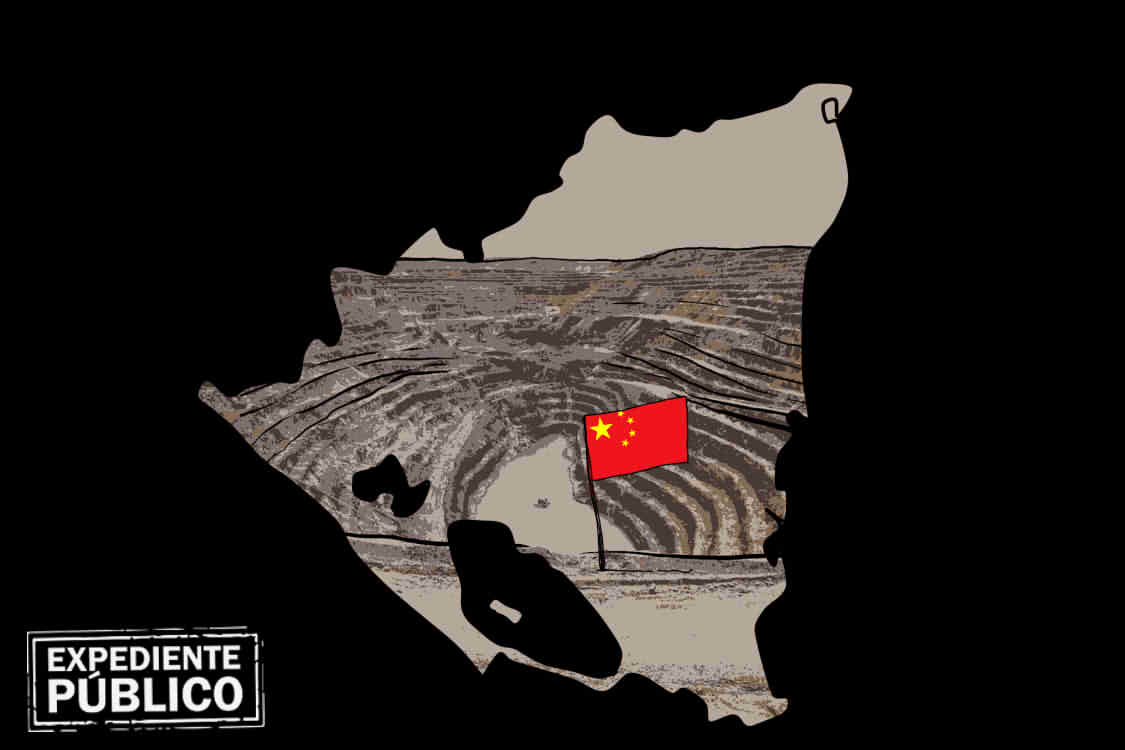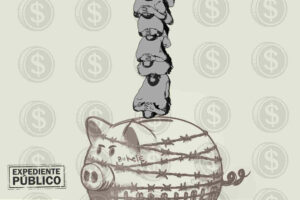* Without knowing the environmental impact studies, Daniel Ortega’s regime handed over large areas in western Nicaragua and the Caribbean to three Chinese companies for mining exploitation.
** The arrival of Chinese companies in the Caribbean causes concern among environmentalists and human rights activists.
***The environmentalist, Amaru Ruiz, explained to Expediente Público that the Ortega-Murillo regime is looking for alternatives to the United States for the commercialization of gold.
Expediente Público
Since 2023, the Nicaraguan regime has handed over a total of 222,125.6 hectares of metallic and non-metallic mining to three companies linked to China, both in the Pacific and the Caribbean, according to official documents from the Ministry of Energy and Mines (MEM) and the country’s official newspaper, La Gaceta.
The three mining companies obtained concessions with a validity of 25 years. With this, the relations between the Daniel Ortega regime and the People’s Republic of China are becoming increasingly closer.
The Sandinista regime, which has governed Nicaragua since 2007, takes advantage of these mining concessions as cooperation propaganda, although it is the delivery of extensive territories in “exclusivity” to Chinese mining companies.
The Nicaraguan legal digest that groups together all the laws of the energy and mining sector, approved on November 11, 2020, grants the holder of the mining concession the “exclusive right to carry out the work,” which includes the recognition of exploration and exploitation of mineral substances.
Zhong Fu Development S.A., Nicaragua Xinxin Linze Minera Group S.A., and Thomas Metal S.A. are the three companies that received mining concessions to operate in the Central American country, and that also have other applications pending acceptance before the MEM.
Subscribe to the Expediente Público newsletter and receive more information
Exiled Nicaraguan environmentalist and president of Fundación del Río, Amaru Ruiz, worries that the regime will continue to promote Nicaragua as a “mining district” and that companies of Chinese origin will focus their attention on the country, due to its history of poor labor practices and history of corruption.
“They have a historical behavior of non-compliance with environmental and social standards worldwide, and that is extremely worrying, because what it raises is the risk that Chinese companies may not take responsibility for the environmental and social impacts,” Ruiz added.
Behind the Nicaraguan gold
In 2021, Nicaragua broke diplomatic relations with Taiwan to recognize the “one China” principle. Since then, political and commercial exchange and investment announcements have increased.
According to information published in the official newspaper La Gaceta, the lots granted by the Ortega-Murillo regime for mining exploitation to Chinese companies are located particularly in the Chinandega area, in the northwest, and in the North Caribbean.
The most recent mining concession was granted to Thomas Metal S.A. on April 24, 2024. The company acquired rights for the exploitation of metallic and non-metallic minerals in the Carambola lot, which has an area of 8,308.90 hectares.
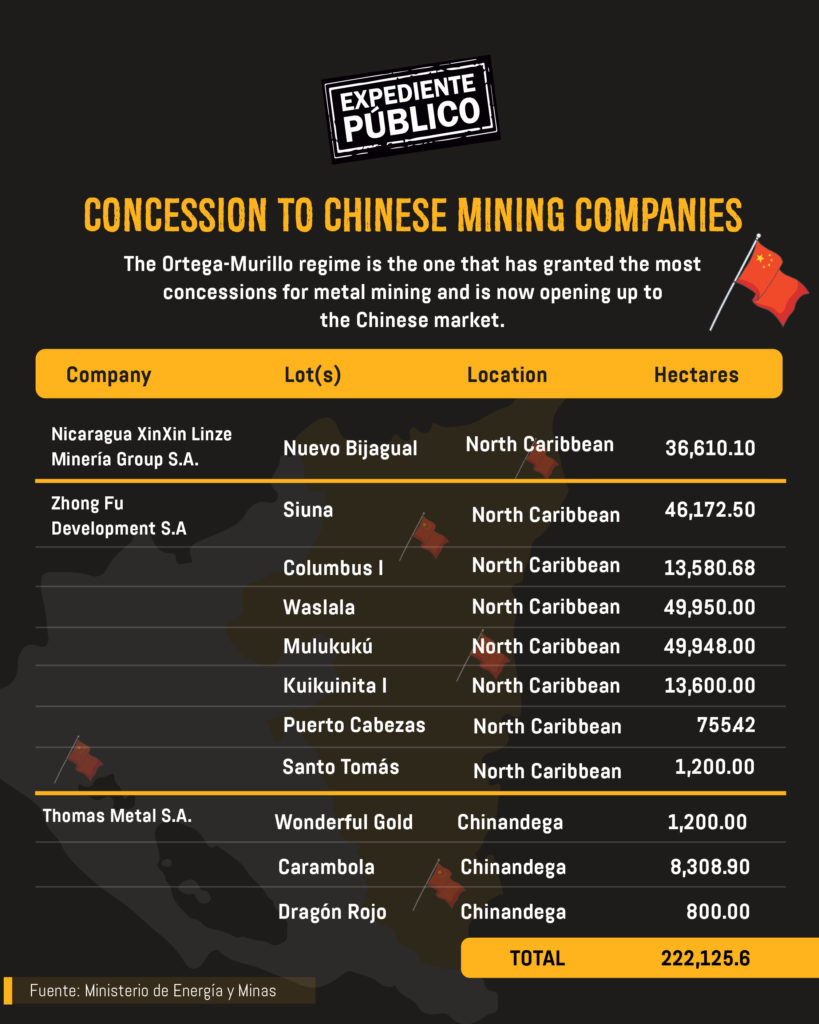
The Deputy Minister of Energy and Mines, Estela María Virginia Cerrato, also approved a concession for the mining of 800 hectares called Dragón Rojo. Both lots are located in the Villa Nueva municipality, in Chinandega.
The Chinese citizen, Xiangming Gu, with a Nicaraguan residency card, is the representative of Thomas Metal and is the one who made the arrangements with the MEM.
The name of the Thomas Metal company first resonated in the Nicaraguan mining business on November 24, 2023, when it applied for the concession of the 1,200-hectare Wonderful Gold lot also located in the Villanueva area.
Chinese companies “colonize” the Caribbean
Nicaragua Xinxin Linze Minera Group S.A. obtained permits from the MEM to exploit the Nuevo Bijagual lot, which covers 36,610.10 hectares in Siuna and Mulukukú, municipalities located in the North Caribbean of the Central American country.
The Chinese company was approved for the concession in record time, after applying for it on November 13, 2023. In less than a month, on December 1, 2023, the MEM ruled on the request and responded that “the profile of the technical review meets the corresponding requirements.”
You can read: Gold and Blood in Nicaragua’s Caribbean: Mineral Wealth in the Indigenous-Settler Conflict
In February of this year, the company began building its camp in the Liberian community of Mulukukú.
It is an unknown company, although many media outlets link it to Xinjiang Xinxin Mining Industry Company Limited, a company with interests in various non-ferrous metals, such as nickel and copper, but only operating in China.
The company is said to have the “technical and financial capacity” to develop mining activities in the Central American country and has two other applications pending approval, which it submitted on October 9, 2023, for metal exploitation.
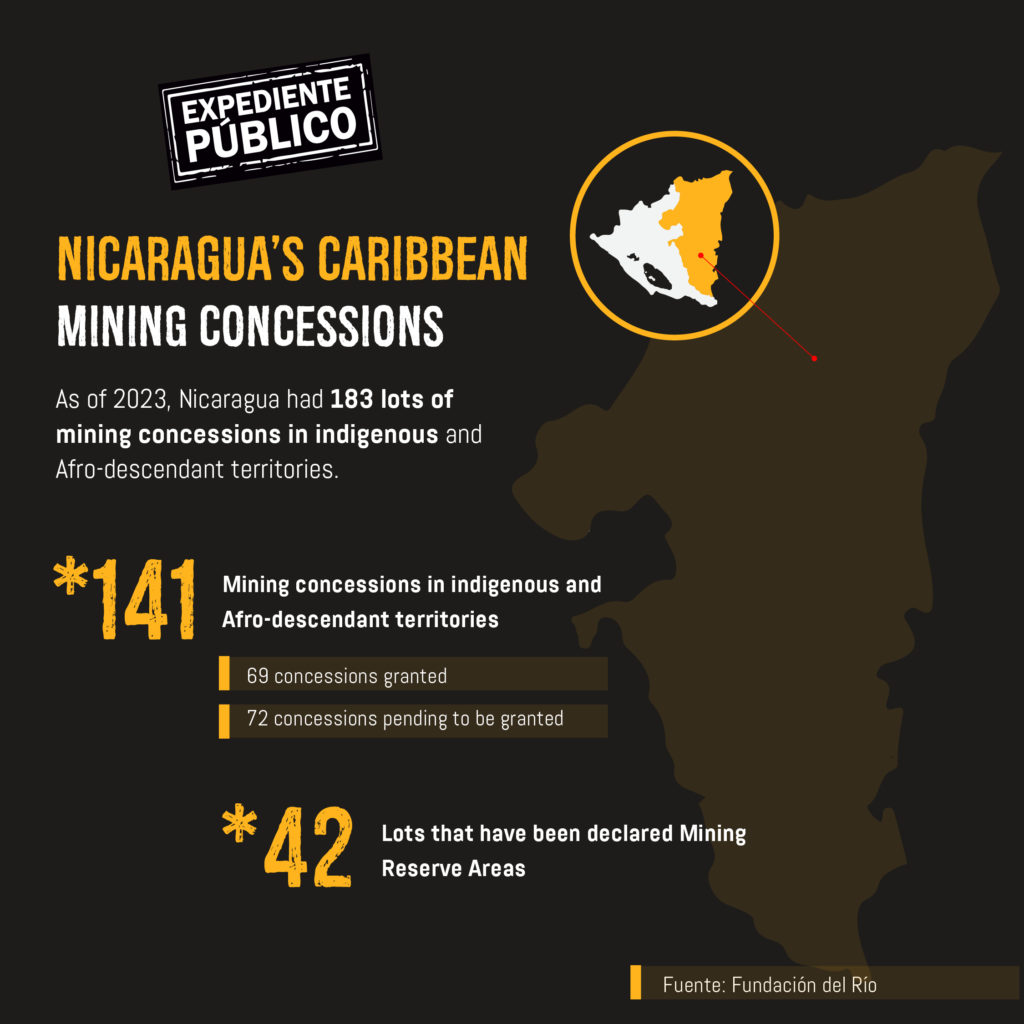
One of the lots, pending approval, is called “Chinotega,” and does not mention its location, measures 651 hectares. Another called “Caribe” measures 2,091 hectares.
Nicaragua Xinxin Linze Minera Group S.A. was formally incorporated in Managua and is represented by the Chinese citizen Edward Xiang Liu, who has a Nicaraguan residence card and makes the arrangements before government institutions.
Company leads operations in the Caribbean
In less than a year, Zhong Fu Development S.A. became the second largest mining company in the country, based on mining in the Caribbean of Nicaragua. It has a total concession area of 174,006.6 hectares distributed in Puerto Cabezas, Siuna, Waslala and Mulukukú, according to information from the MEM.
In comparison, Calibre Mining has 1.5 million hectares concessioned or requested, while HEMCO has about 150,000 hectares nationwide, out of a total of 2.77 million hectares ceded or requested for mining in Nicaragua.
Zhong Fu Development is also another unknown company, represented by Feiwu Bian, a resident of Nicaragua.
The company is linked to Zhong Fu Invest Group, a venture capital firm with investments in technology based in Beijing, but with no known operations outside China or in mining, as documented by Expediente Público.
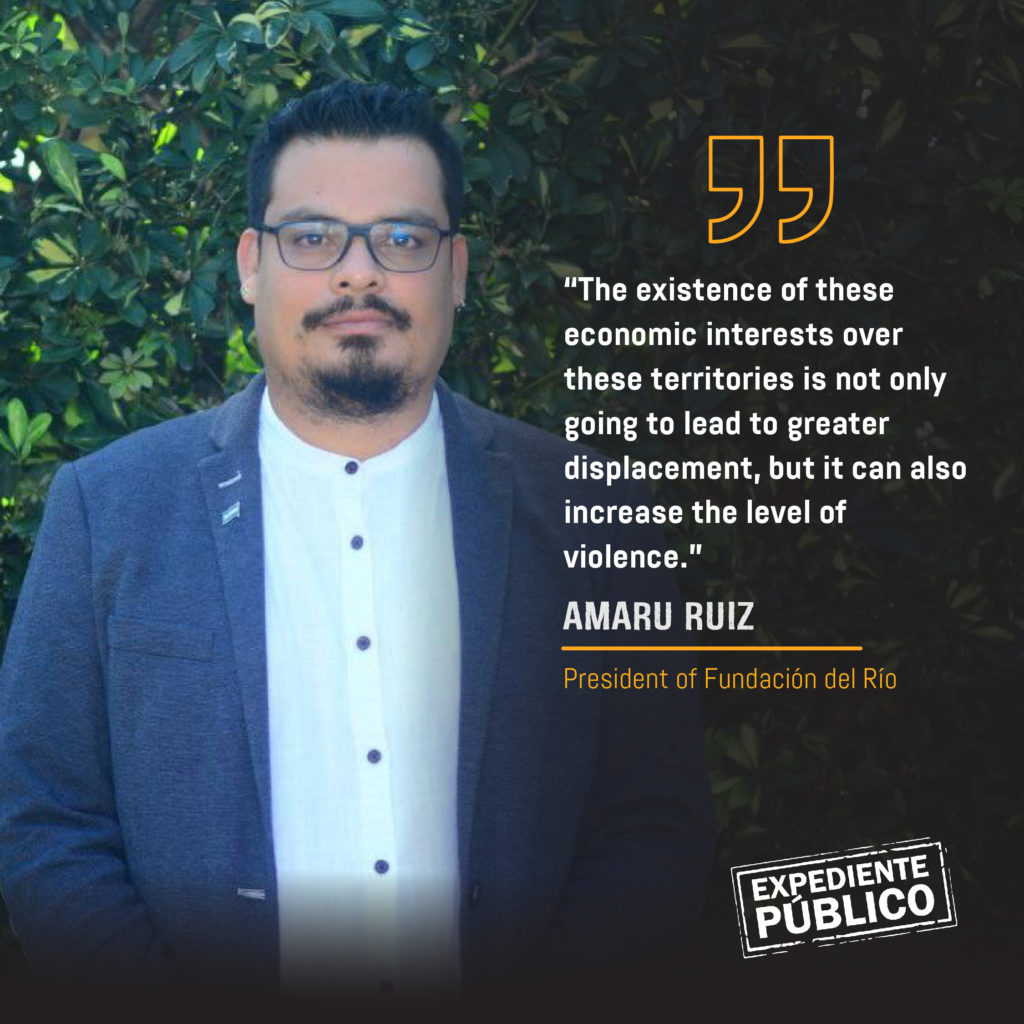
The lots located in Waslala (49,950.00), Mulukukú (49,948.00) and Siuna (46,172.50) are the largest that the regime has ceded to this Chinese company. Zhong Fu Development has a 20,150.00-hectare lot called Waspan pending.
Read more: Natural resources of communities in Nicaragua’s Caribbean at risk due to China’s voracity
The most recent award was announced in November 2023. The Ortega-Murillo regime granted the Chinese company Zhong Fu Development S.A. the lot called Santo Tomás that totals 1,200 hectares and is located in the municipalities of Cinco Pinos and Santo Tomás in the department of Chinandega, in the west of the country.
Danger of environmental damage
The growing demand for gold is putting strong pressure on zones. The Columbus I lot, awarded to Zhong Fu Development, is located in the zone of Cerro Miramar in the North Caribbean, which serves as a “source of drinking water for the community of Sahsa,” the Platform of Indigenous and Afro-descendant Peoples (Inana-AIP) denounced almost a year ago.
Columbus I has an area of 13,580.68 hectares and was awarded to the company Zhong Fu Development S.A.
“Alicia,” a Nicaraguan activist from the Northern Caribbean, explained to Expediente Público that mining companies “have done a lot of damage” under the false discourse that they provide employment in communities.
“Since the mining companies have entered, we have wondered what progress has been made in these territories,” denounced “Alicia.”
“For us the impact is huge, because in the communities we don’t have access to drinking water and we live off the environment, we drink from the nearest rivers and everything is being contaminated,” she said.
Data from the Ministry of Energy and Mines reveals that, as of March 1, 2024, at least 2,778,081 hectares in the country, equivalent to 23% of Nicaragua’s national territory, are included in lots that were given in concession or were requested for mining purposes.
A report by Fundación del Río identifies 19 companies with mining concessions within indigenous and Afro-descendant territories.
The Canadian company Calibre Mining Nicaragua S.A., with almost one million hectares, is the one that “has the most concessions and the one that affects the largest number of indigenous territories.” Additionally, it has more than half a million hectares in demand.
China Adds to Voracity in the Caribbean
“Alicia” points out that the regime violates Law 445 on the right to communal property in the Caribbean regions, which states that the community assembly is in charge of making decisions on matters that are of community interest.
The State must consult indigenous peoples to obtain their free, prior, and informed consent. “None of this is being done,” says “Alice.”
“How does it benefit us and why do we want mining companies if we are suffering invasion (from settlers). We don’t want any more mining companies in our territories that are only looting, while on the other hand the settlers are killing us,” denounces “Alicia.”
The dynamics in indigenous and Afro-descendant territories are “different,” insists the Nicaraguan activist.
“In our territories, the one who has the highest authority is the Assembly, and who is the Assembly, the community (…). The community is supposed to meet and vote by consensus on whether or not to allow the mining company to enter, but it is never done,” “Alicia” responds.
Bypassing sanctions with Chinese mining companies
To date, environmental impact studies are unknown and the extended certifications do not explain what type of metal the Chinese companies will exploit.
But it is clear that the regime “is trying not to depend so much on the U.S. export market, but is looking for other outlets,” particularly to the gold trade, Ruiz explains.
On October 24, 2022, the U.S. Treasury Department sanctioned the General Directorate of Mines (DGM), subordinate to the MEM, for being a key “piece” in gold export operations, whose income from production and sales serves to line pockets and “pay those who keep the regime in power.”
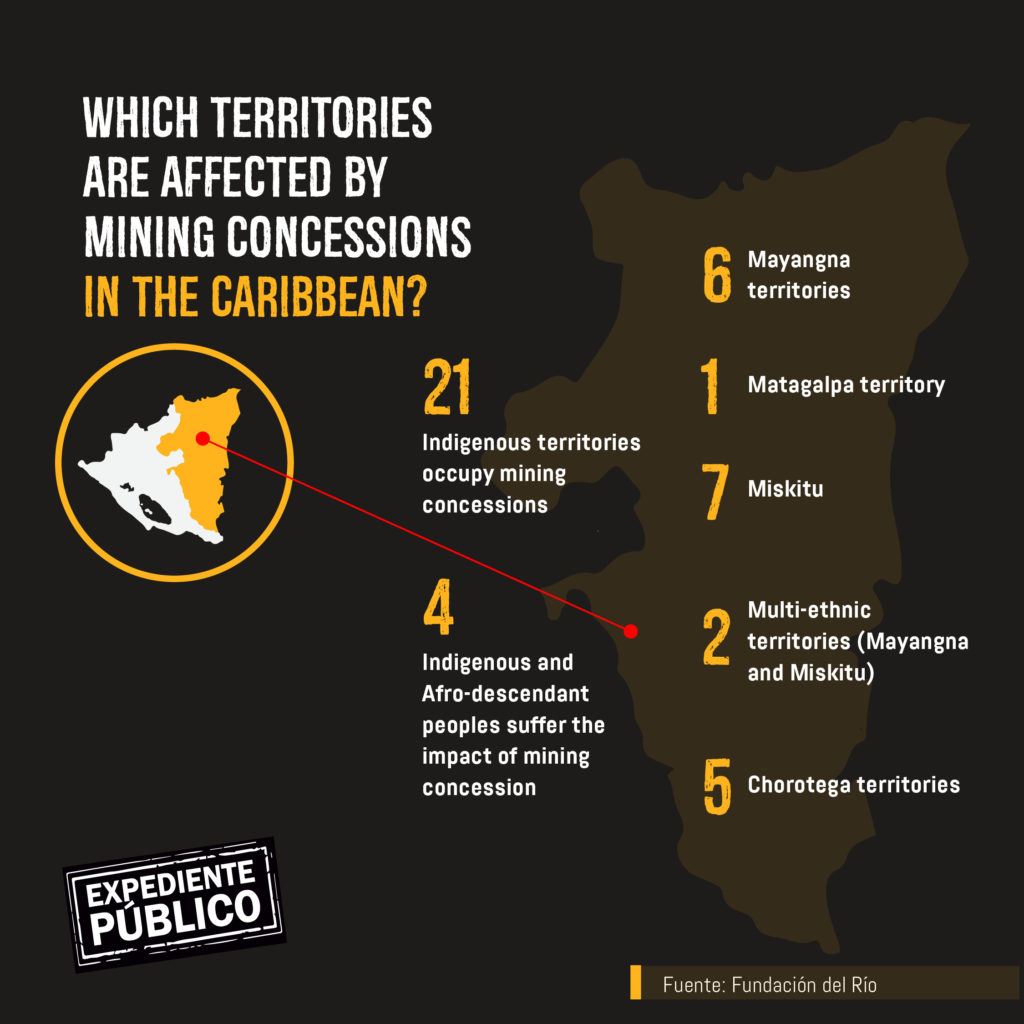
“We are seeing a fall in the footsteps of the sanctions established by the United States on the gold sector by the Ortega Murillo regime.”
“It shows that the regime is trying to look for other options in the face of any additional restrictions that the United States puts on gold. That has led us to see new concessions granted,” Ruiz explained to Expediente Público.
Also: Trade deals: China’s hidden move in Nicaragua and Honduras
Since the designation of the state-owned Nicaraguan Mining Company (Eniminas) in June of 2022, the DGM managed most mining operations in Nicaragua on behalf of the regime.
Threat of violence and displacement
The arrival of these Chinese companies is framed in a context of repression and socio-political crisis, where the population cannot protest due to the risk of being imprisoned.
The populations of the Nicaraguan Pacific, and the indigenous and Afro-descendant inhabitants, also see the arrival of Chinese mining companies in a context of persistent generalized and structural impunity with respect to the serious human rights violations committed since 2018.
Ruiz points out that the “economic interests” of the regime and mining companies, particularly in the Caribbean area, mean greater violence and displacement, because in the Miskito and Mayangna communities, “they have a vocation for resistance.”
“The interests of invaders who arrive with economic interests, with associated companies or simply to sell to those companies, obviously they want to evict those people and they do it violently, because they encounter resistance. So it is clear that not only displacement, but also violence in these territories can increase,” Ruiz explains.
Mining exports
Miskito leader Manuel Prado, president of the Nicaraguan American Foundation (Funadec) in the United States, emphasizes the frequent militarization of Army and Police personnel in the Caribbean areas.
“That means that the dictatorship wants to protect the resources in that area (…) The area that is most affected by human rights violations is the area that has the most deployment and militarization. It is clear that the dictatorship wants to protect economic investments in the region with the Army and the Police,” Prado adds.
The mining industry recorded exports of 1.1586 billion dollars in 2023, which meant an increase of 22.4% compared to 2022, driven by increases in gold exports, according to the Central Bank of Nicaragua.

